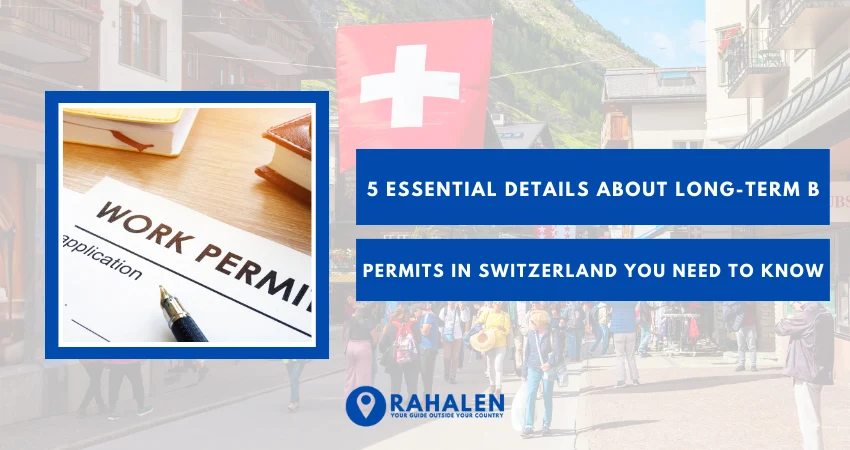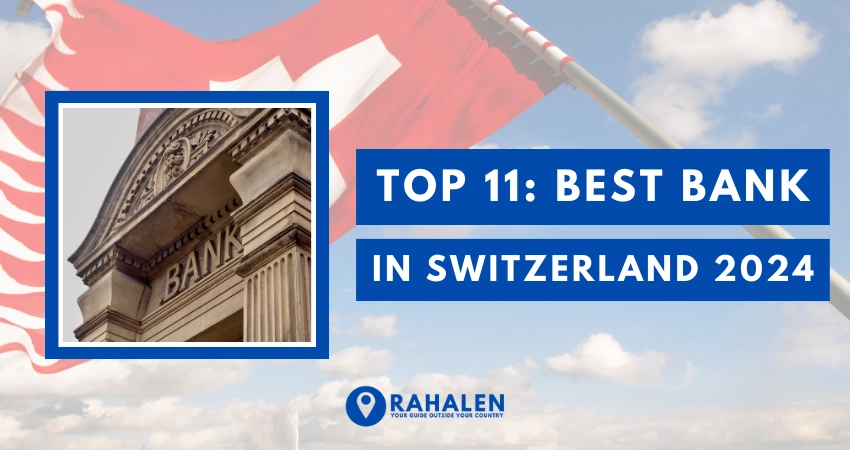In Switzerland, the Long-Term B Permits is a vital document for non-citizens wishing to reside and work in the country for an extended period. These permits, issued to individuals from non-EU/EFTA countries, are crucial in facilitating legal residence and employment opportunities.
Long-Term B Permits in Switzerland
Long-Term B Permits in Switzerland allow non-citizens to reside and work in the country for an extended period, typically one year initially with the possibility of renewal.
These permits are granted to individuals who meet specific eligibility criteria, such as having a job offer from a Swiss employer or demonstrating sufficient financial resources.
Holders of Long-Term B Permits enjoy stability, access to employment opportunities, social services, and integration support in Switzerland.
How long is B permit in Switzerland?

In Switzerland, the duration of a B permit, also known as a residence permit, can vary depending on individual circumstances and the type of permit obtained. However, in general:
- Initial Validity: A B permit is typically issued with an initial validity period of one year. This initial permit allows the holder to reside and work in Switzerland for that duration.
- Renewal: After the initial validity period, the B permit can be renewed upon application. Renewal is contingent upon meeting certain criteria, such as continued employment or financial stability and compliance with Swiss laws and regulations.
- Renewal Period: The renewal period for a B permit can also vary but is usually granted for another one or two years. The renewal process must be initiated before the expiration of the current permit to ensure continuous residency and work authorization in Switzerland.
- Long-Term Residence: In some cases, individuals may be eligible for long-term B permits, which offer extended validity periods beyond the typical one or two years. Long-term B permits provide greater stability and security for individuals residing in Switzerland for an extended period.
- Dependents: Family members of B permit holders, such as spouses and children, may also be granted B permits with similar validity periods, allowing them to accompany the primary permit holder and reside in Switzerland.
Overall, the duration of a B permit in Switzerland depends on factors such as the type of permit obtained, individual circumstances, and compliance with renewal requirements.
By adhering to Swiss immigration regulations and fulfilling renewal criteria, permit holders can maintain their residency status and enjoy the benefits of living and working in Switzerland.
Read Here: Top 30: Unskilled Jobs in Switzerland for English Speakers
Eligibility Criteria for Long-Term B Permits
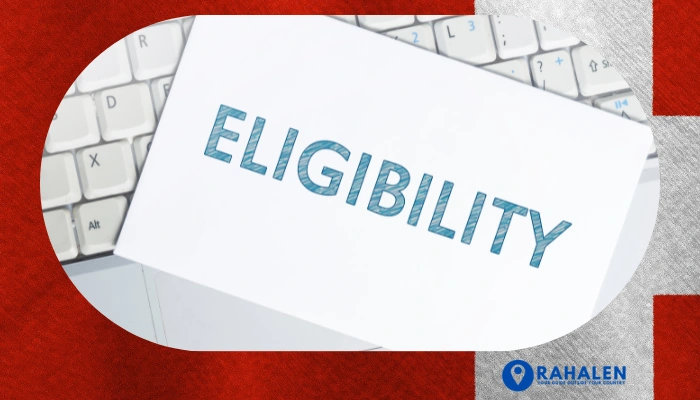
The eligibility criteria for Long-Term B Permits in Switzerland are essential factors that individuals must fulfill to qualify for residency and employment.
These criteria are designed to ensure that applicants meet specific employment and financial stability standards.
Below are the key aspects of the eligibility criteria for Long-Term B Permits:
- Employment Requirements: One of the primary ways to qualify for a Long-Term B Permit is through employment in Switzerland. Applicants must secure a job offer from a Swiss employer before applying for the permit. The job offer should typically be for a position that cannot be filled by a Swiss citizen or an EU/EFTA national, emphasizing the importance of non-citizen workers to the Swiss economy.
- Financial Stability Criteria: Individuals who do not have a job offer may still be eligible for a Long-Term B Permit based on their financial resources. Applicants must demonstrate that they have sufficient funds to support themselves financially during their stay in Switzerland. This could involve providing bank statements, investment portfolios, or other evidence of financial stability.
- Health Insurance Coverage: Another crucial aspect of eligibility is having adequate health insurance coverage. Applicants must show proof of health insurance that meets the requirements set by Swiss authorities. This ensures that individuals can access necessary healthcare services while residing in Switzerland.
- Clean Criminal Record: Applicants must also have a clean criminal record in Switzerland and any country of previous residence. Any history of criminal activity could impact an individual’s eligibility for a Long-Term B Permit.
- Compliance with Swiss Laws: Prospective permit holders must agree to comply with Swiss laws and regulations, including those related to residency, employment, and taxation. This includes adhering to Swiss labor laws and fulfilling any obligations of holding a Long-Term B Permit.
- Documentation Requirements: To support their application for a Long-Term B Permit, applicants must provide various documents, including a valid passport, evidence of employment or financial resources, proof of health insurance, and any other relevant paperwork as requested by Swiss authorities.
Overall, meeting the eligibility criteria for Long-Term B Permits requires individuals to either secure employment or demonstrate financial stability, along with complying with legal and administrative requirements set forth by Swiss authorities.
Application Process for a Long-Term B Permit
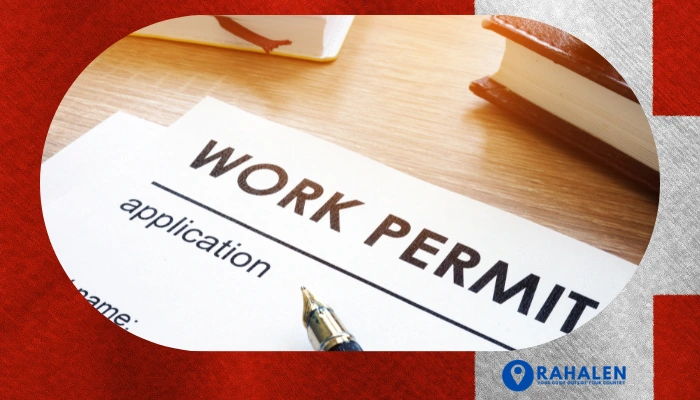
The application process for a Long-Term B Permit in Switzerland involves several steps:
- Preparation: Review eligibility criteria.
- Document Gathering: Gather required documents.
- Application Submission: Submit to the migration office.
- Processing Time: Wait for a decision.
- Interview/Additional Requirements: Attend if needed.
- Decision: Approval or denial notification.
- Permit Issuance: Follow instructions to obtain a permit.
- Validity Period: Usually one year, with a renewal option.
Overall, it requires preparation, document gathering, and submission, ensuring compliance with requirements for residency and employment in Switzerland.
By following these steps and meeting all requirements, applicants can increase their chances of obtaining a Long-Term B Permit and enjoying the benefits of residency and employment in Switzerland.
Duration and Renewal Process

The duration and renewal process for Long-Term B Permits in Switzerland is crucial for individuals seeking to reside and work in the country for an extended period. Here’s an overview:
- Initial Duration: Long-Term B Permits are typically issued with an initial validity period of one year. This means that upon approval, the permit holder is authorized to reside and work in Switzerland for one year from the date of issuance.
- Renewal Eligibility: Permit holders who wish to continue living and working in Switzerland beyond the initial validity period must apply for permit renewal. To be eligible for renewal, applicants must continue to meet the criteria for holding a Long-Term B Permit, including employment or financial stability requirements.
- Renewal Application Process: The renewal process for Long-Term B Permits involves applying to the relevant Swiss authorities before the expiration of the current permit. Like the initial application process, applicants must provide updated documentation to support their renewal request.
- Updated Documentation: Renewal applicants typically need to provide updated documents, such as a new employment contract or evidence of continued financial stability. These documents demonstrate that the applicant’s circumstances have remained unchanged since the initial permit was granted.
- Processing Time: The processing time for permit renewals can vary depending on factors such as the migration office’s workload and the application’s complexity. Applicants should submit their renewal application well before expiration to allow for sufficient processing time.
- Decision: After reviewing the renewal application and supporting documents, Swiss authorities will decide whether to approve or deny the permit renewal. The permit holder will receive notification and instructions on obtaining the renewed permit if approved.
- Validity Period of Renewed Permit: If the renewal application is approved, the Long-Term B Permit will be extended for another specified period, usually another year. Permit holders should know the new expiration date and plan for future renewals if necessary.
- Continued Compliance: Permit holders must continue complying with Swiss laws and regulations throughout the validity period of their permit, including any conditions or requirements specified by the authorities.
Understanding the duration and renewal process for Long-Term B Permits is essential for individuals wishing to maintain legal residency and employment status in Switzerland over an extended period.
By adhering to the renewal procedures and fulfilling all requirements, permit holders can continue to enjoy the benefits of living and working in Switzerland.
What are the benefits of permit B in Switzerland?
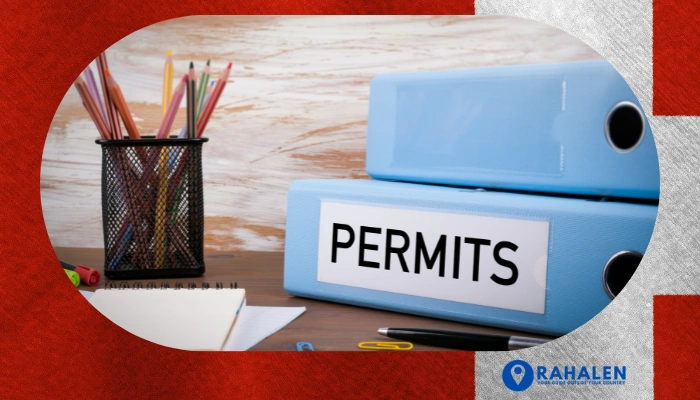
The Long-Term B Permits in Switzerland offer numerous benefits to individuals holding them.
These permits serve as essential documents for non-citizens who wish to reside and work in Switzerland for an extended period.
Below are some key benefits associated with Long-Term B Permits:
- Access to Employment Opportunities: Holders of Long-Term B Permits have access to a wide range of employment opportunities within Switzerland. They can work for Swiss companies or engage in self-employment, contributing to the Swiss economy.
- Stability and Security: Long-Term B Permits provide stability and security to individuals by allowing them to reside in Switzerland for an extended period. This stability facilitates long-term planning and integration into Swiss society.
- Social Services and Benefits: Permit holders are entitled to various social services and benefits in Switzerland. This includes access to healthcare, education, and social assistance programs, ensuring their well-being and their families.
- Residency Rights: Long-Term B Permits grant individuals the right to legally reside in Switzerland for an extended duration, offering a pathway to long-term settlement in the country.
- Travel Flexibility: Permit holders enjoy flexibility in travel within the Schengen Area, as Switzerland is a member state. Without additional visas, they can travel freely to other Schengen countries for tourism, business, or personal reasons.
- Family Reunification: Long-Term B Permit holders may be eligible to sponsor their family members for residency permits, facilitating family reunification in Switzerland.
- Integration Opportunities: Holding a Long-Term B Permit allows individuals to integrate into Swiss society more effectively. They can participate in language courses, cultural activities, and community events, enhancing their sense of belonging.
- Career Development: With access to stable employment and residency, permit holders can focus on their career development and advancement opportunities within Switzerland.
- Legal Protections: Long-Term B Permit holders are entitled to certain legal protections under Swiss law, including labor rights, protection against discrimination, and access to legal recourse in case of disputes.
- Quality of Life: Overall, Long-Term B Permits contribute to a higher quality of life for individuals residing in Switzerland by providing access to employment, social services, and a secure living environment.
In summary, Long-Term B Permits offer many benefits, including access to employment, social services, residency rights, travel flexibility, family reunification, integration opportunities, career development, legal protections, and improved quality of life for individuals residing in Switzerland.
Challenges and Restrictions
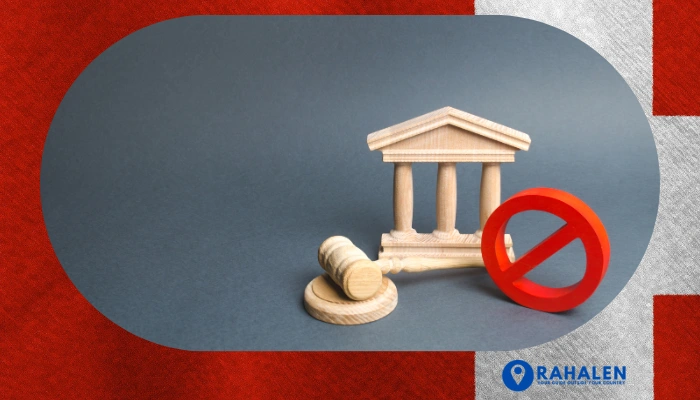
While Long-Term B Permits in Switzerland offer numerous benefits, certain challenges and restrictions permit holders may encounter.
Understanding these challenges is essential for individuals considering obtaining or renewing a Long-Term B Permit.
Here are some key challenges and restrictions associated with Long-Term B Permits:
- Limitations on Job Types: Long-Term B Permit holders may face restrictions on the types of jobs they can undertake. Certain professions or industries may have specific requirements or quotas for non-citizen workers, limiting employment opportunities for permit holders.
- Residency Requirements: Long-term B Permit holders are typically required to maintain continuous residency in Switzerland. This means they must remain in the country for a certain period each year to retain their permit status. Please meet residency requirements to avoid permit revocation or non-renewal.
- Language Proficiency: Integration into Swiss society often requires proficiency in one of the official languages of Switzerland, such as German, French, or Italian. Long-Term B Permit holders may need help adapting to the language and cultural norms, particularly if they are not fluent in the local language.
- Social Integration: Adjusting to life in a new country can be challenging. Long-Term B Permit holders may need help in social integration. Building a social network, understanding local customs, and adapting to cultural differences requires time and effort.
- Financial Stability: While Long-Term B Permit holders are expected to have sufficient financial resources to support themselves, maintaining financial stability over the long term can be challenging. Economic fluctuations, unexpected expenses, and changes in employment status may impact financial security.
- Healthcare Costs: While Switzerland offers high-quality healthcare services, the cost of healthcare can be significant. Long-Term B Permit holders must ensure adequate health insurance coverage to meet their healthcare needs, which can be costly, especially for families.
- Legal Compliance: Long-Term B Permit holders must comply with Swiss laws and regulations, including those related to residency, employment, and taxation. Failure to comply with legal obligations could result in fines, penalties, or even deportation.
- Cultural Adjustment: Adjusting to a new culture and way of life can be challenging for Long-Term B Permit holders, especially if they come from vastly different cultural backgrounds. Adapting to Swiss customs, traditions, and social norms requires patience and openness.
- Work-Life Balance: Work and personal life can be challenging, especially in a new environment. Long-Term B Permit holders may face pressure to excel in their careers while prioritizing family, health, and well-being.
- Housing Costs: Switzerland has a high cost of living, including housing expenses. Long-Term B Permit holders may need help finding affordable housing, especially in urban areas with high demand and limited availability.
Overall, while Long-Term B Permits offer opportunities for residency and employment in Switzerland, they also come with challenges and restrictions that individuals must navigate.
By understanding and addressing these challenges, permit holders can better adapt to life in Switzerland and maximize the benefits of their permit status.
Where can I travel with Swiss permit B?
With a Swiss permit B, holders can travel freely within the Schengen Area for up to 90 days within a 180-day period without needing a visa.
Travel to non-Schengen countries may require additional visas. Permit holders can freely travel within Switzerland and re-enter the country as long as the permit remains valid
Comparison with Other Permit Types
here’s a comparison table outlining the differences between Long-Term B Permits and other types of permits in Switzerland:
| Aspect | Long-Term B Permits | Short-Term L Permits |
|---|---|---|
| Duration | Typically valid for one year initially, with renewal option | Usually issued for short durations (e.g., 3-12 months) |
| Purpose | Allows for long-term residence and employment in Switzerland | Intended for short-term work assignments or projects |
| Eligibility Criteria | Requires employment or financial stability for eligibility | Often issued for specific job assignments or training programs |
| Renewal Process | Permit renewal required after initial validity period | May not be renewable, depending on the circumstances |
| Employment Opportunities | Offers access to a wide range of job opportunities in Switzerland | Limited to specific job assignments or projects |
| Travel Flexibility | Allows for travel within the Schengen Area for tourism or business purposes | Restricted to Switzerland for the duration of the permit |
| Family Reunification | May allow for sponsorship of family members for residency permits | Limited options for family reunification |
| Integration Requirements | May require participation in language courses and cultural integration programs | Typically does not involve integration requirements |
| Stability and Security | Offers stability and security for long-term residence in Switzerland | Provides temporary residence for the duration of the permit |
| Housing and Social Integration | Allows for better integration into Swiss society due to long-term residency | May result in less social integration due to temporary status |
This table provides a comparison between Long-Term B Permits and Short-Term L Permits in Switzerland, highlighting differences in duration, purpose, eligibility criteria, renewal process, employment opportunities, travel flexibility, family reunification, integration requirements, stability, housing, and social integration.
Impact on Family Members
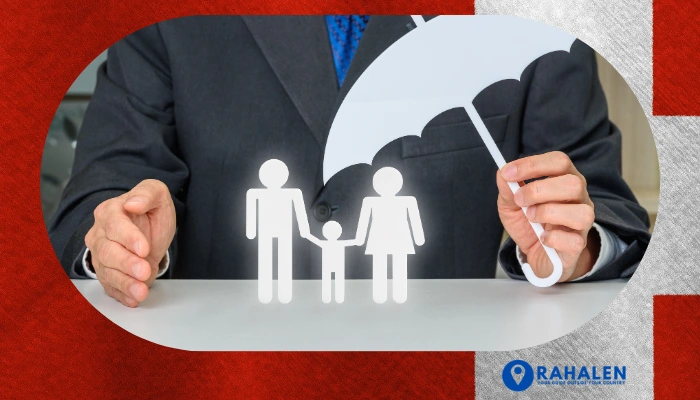
The impact on family members of individuals holding Long-Term B Permits in Switzerland is an important consideration, as it affects their ability to accompany or join the permit holder in the country.
Here’s a comprehensive overview of the impact on family members:
- Spousal and Dependent Permit Options: Long-Term B Permit holders may have the opportunity to sponsor their spouses and dependent family members for residency permits in Switzerland. This allows families to stay together and enjoy the benefits of living in Switzerland as a unit.
- Rights and Privileges: Family members granted residency permits in Switzerland typically have similar rights and privileges as the primary Long-Term B Permit holder. This includes access to employment, social services, healthcare, and education.
- Residency Requirements: Family members sponsored under a Long-Term B Permit are subject to the same residency requirements as the primary permit holder. They must maintain continuous residency in Switzerland to retain their permit status.
- Integration and Language Requirements: Depending on their circumstances, family members may be required to fulfill integration and language requirements similar to the primary permit holder. This may include participation in language courses and cultural integration programs.
- Employment Opportunities: Spouses and dependent family members holding residency permits in Switzerland may also have access to employment opportunities, allowing them to contribute to the household income and integrate into Swiss society.
- Education for Children: Children of Long-Term B Permit holders and their family members are entitled to access the Swiss education system, including public schools and educational resources. This ensures that children receive a quality education while residing in Switzerland.
- Healthcare Coverage: Family members sponsored under a Long-Term B Permit are typically included in the permit holder’s health insurance coverage, ensuring access to healthcare services in Switzerland.
- Legal Protections: Family members residing in Switzerland under a Long-Term B Permit are entitled to certain legal protections under Swiss law, including labor rights, protection against discrimination, and access to legal recourse in case of disputes.
- Renewal Process: When the primary Long-Term B Permit holder applies for permit renewal, the permits of accompanying family members may also need to be renewed. This ensures that the entire family can continue to reside legally in Switzerland.
Overall, the impact on family members of individuals holding Long-Term B Permits in Switzerland is significant, as it determines their ability to accompany or join the permit holder in the country and access various rights and privileges.
By understanding the implications for family members, permit holders can make informed decisions and navigate the immigration process effectively.
Integration and Language Requirements
Integration and language requirements are crucial in obtaining and maintaining a Long-Term B Permit in Switzerland.
These requirements promote social cohesion, cultural integration, and effective communication within Swiss society.
Here’s an overview of integration and language requirements for Long-Term B Permit holders:
- Language Proficiency: Proficiency in one of the official languages of Switzerland (German, French, or Italian) is often a prerequisite for obtaining a Long-Term B Permit. Applicants may need to demonstrate their language skills through language proficiency tests or by completing language courses recognized by Swiss authorities.
- Integration Courses: Some cantons in Switzerland require Long-Term B Permit holders to participate in integration courses as part of the residency process. These courses cover various topics, including Swiss culture, society, legal system, and norms, helping individuals adapt to life in Switzerland.
- Cultural Awareness: Understanding Swiss customs, traditions, and social norms is essential for successful integration into Swiss society. Long-Term B Permit holders are encouraged to familiarize themselves with Swiss culture and etiquette to facilitate social interactions and community engagement.
- Participation in Community Activities: Community activities, cultural events, and social gatherings can enhance integration efforts. Long-Term B Permit holders are encouraged to engage with local communities, volunteer, and build social networks to foster a sense of belonging.
- Access to Language Resources: Swiss authorities provide various language resources, including language courses, language schools, and language proficiency exams, to support integration efforts. These resources help individuals improve their language skills and navigate daily life in Switzerland more effectively.
- Residency Renewal Requirements: In some cases, Long-Term B Permit holders may be required to demonstrate continued language proficiency and participation in integration activities as part of the permit renewal process. This ensures an ongoing commitment to integration and cultural adaptation.
- Support Services: Integration support services, such as counseling, mentoring, and community outreach programs, are available to assist Long-Term B Permit holders in their integration journey. These services provide guidance, resources, and support to individuals and families adjusting to life in Switzerland.
- Benefits of Integration: Successful integration into Swiss society offers numerous benefits, including enhanced social connections, improved career opportunities, and a greater sense of belonging. By embracing integration efforts, Long-Term B Permit holders can fully experience Switzerland’s cultural richness and diversity.
Overall, integration and language requirements are integral components of Switzerland’s Long-Term B Permit process.
By fulfilling these requirements and actively participating in integration activities, permit holders can enhance their integration efforts and contribute positively to Swiss society.
Employer Sponsorship
Employer sponsorship is critical to obtaining a Long-Term B Permit in Switzerland, as it involves a Swiss employer sponsoring and supporting a non-citizen employee’s residency and work authorization in the country.
Here’s a comprehensive overview of employer sponsorship:
- Role of the Employer: Swiss employers play a central role in the Long-Term B Permit application process by sponsoring and supporting non-citizen employees who wish to reside and work in Switzerland. The employer acts as a sponsor, endorsing the employee’s application and assuming certain obligations towards them.
- Job Offer: The first step in employer sponsorship is for the Swiss employer to extend a job offer to the non-citizen employee. The job offer typically includes details such as the position title, job description, salary, start date, and duration of employment.
- Work Contract: Upon accepting the job offer, the non-citizen employee and the Swiss employer enter into a formal employment contract. The contract outlines the terms and conditions of employment, including rights, responsibilities, benefits, and termination provisions.
- Obligations Towards Sponsored Employees: By sponsoring a non-citizen employee for a Long-Term B Permit, the Swiss employer assumes certain obligations towards the employee. These obligations include providing a suitable work environment, ensuring compliance with Swiss labor laws, and supporting the employee’s integration into Swiss society.
- Document Preparation: Once the job offer is accepted, the Swiss employer assists the employee in preparing the necessary documentation for the Long-Term B Permit application. This may include providing employment letters, confirming financial stability, and completing required forms or applications.
- Submission of Application: The Long-Term B Permit application, along with supporting documentation, is submitted to the relevant Swiss authorities by the employee, with assistance and endorsement from the employer. The application is typically submitted to the cantonal migration office responsible for the employee’s intended place of residence and work.
- Verification Process: Swiss authorities review the Long-Term B Permit application to ensure compliance with eligibility criteria and legal requirements. This may involve verifying the authenticity of documents, conducting background checks, and assessing the employer’s sponsorship and support.
- Approval and Permit Issuance: If the Long-Term B Permit application is approved, the employee receives notification from the Swiss authorities and instructions on obtaining the permit. The permit is typically issued for an initial period, with the possibility of renewal.
- Ongoing Support: Throughout the employment relationship, the Swiss employer supports the sponsored employee by providing guidance, resources, and assistance as needed. This includes addressing any changes in employment status or circumstances that may affect the Long-Term B Permit.
- Compliance with Legal Obligations: Both the employer and the sponsored employee must comply with Swiss laws and regulations, including those related to employment, residency, and taxation. Failure to meet legal obligations could result in penalties, fines, or revocation of the Long-Term B Permit.
Overall, employer sponsorship is a collaborative process between Swiss employers and non-citizen employees seeking Long-Term B Permits in Switzerland.
By fulfilling their obligations and supporting their employees, employers play a crucial role in facilitating legal residency and employment for non-citizen workers in the country.
Legal Obligations and Responsibilities
Legal obligations and responsibilities are essential for individuals holding Long-Term B Permits in Switzerland. These obligations encompass various laws, regulations, and requirements permit holders must adhere to during their stay in the country. Here’s an overview of the legal obligations and responsibilities:
- Residency Requirements: Long-Term B Permit holders must comply with residency requirements, including maintaining continuous residency in Switzerland. This involves residing at the registered address and updating authorities in case of any changes in residence.
- Employment Obligations: Permit holders in Switzerland must adhere to Swiss labor laws and regulations. This includes fulfilling employment contracts, working within authorized parameters, and respecting workplace rights and obligations.
- Tax Compliance: Long-Term B Permit holders are subject to Swiss taxation laws and must fulfill their tax obligations accordingly. This includes declaring income, assets, and other relevant financial information to Swiss tax authorities.
- Health Insurance Coverage: Permit holders are required to maintain adequate health insurance coverage throughout their stay in Switzerland. This ensures access to necessary healthcare services and compliance with Swiss healthcare regulations.
- Criminal Record: Long-Term B Permit holders must maintain a clean criminal record and refrain from engaging in criminal activities during their stay in Switzerland. Any criminal convictions could jeopardize their permit status and lead to deportation.
- Integration and Language Requirements: Some cantons in Switzerland may impose integration and language requirements on Long-Term B Permit holders. This may include participation in integration courses, language proficiency tests, and cultural adaptation programs.
- Compliance with Permit Conditions: Permit holders must comply with the conditions specified in their Long-Term B Permits, including any restrictions on employment, residency, or travel. Violating permit conditions could result in permit revocation or other legal consequences.
- Notification of Changes: Permit holders must notify Swiss authorities of any changes in their circumstances, such as changes in employment status, marital status, or address. Failure to report changes promptly could result in administrative penalties.
- Renewal Requirements: Permit holders must initiate the renewal process for their Long-Term B Permits promptly before expiration. This involves submitting renewal applications and fulfilling any additional requirements specified by Swiss authorities.
- Legal Compliance: Overall, Long-Term B Permit holders are expected to comply with Swiss laws, regulations, and administrative requirements throughout their stay in the country. This includes adherence to legal and administrative obligations associated with residency, employment, taxation, and other aspects of life in Switzerland.
By fulfilling their legal obligations and responsibilities, Long-Term B Permit holders can maintain their legal status in Switzerland and enjoy the benefits of residency and employment there.
Permit holders must stay informed about relevant laws and regulations and seek guidance from authorities or legal professionals to ensure compliance.
Tax Implications
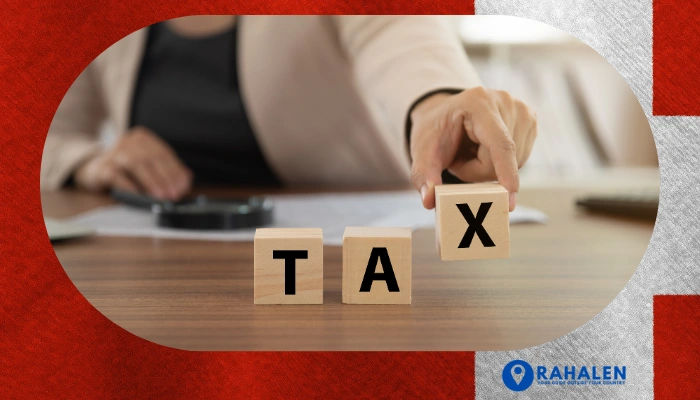
Tax implications for individuals holding Long-Term B Permits in Switzerland are significant and should be carefully understood and managed. Here’s a comprehensive overview of the tax implications:
- Residency-Based Taxation: Switzerland operates on a residency-based taxation system, meaning residents are taxed on their worldwide income. Long-Term B Permit holders who reside in Switzerland for a significant portion of the tax year are considered tax residents and are subject to Swiss taxation on their global income.
- Tax Rates: Switzerland has a complex tax system with varying rates depending on the canton and municipality of residence. Tax rates can differ significantly between regions, so Long-Term B Permit holders must familiarize themselves with the tax rates applicable to their specific location.
- Types of Taxes: Long-Term B Permit holders in Switzerland may be subject to various types of taxes, including income tax, wealth tax, property tax, and value-added tax (VAT). The tax obligations and rates vary depending on the individual’s income, assets, and activities.
- Tax Treaties: Switzerland has tax treaties with many countries to prevent double taxation and regulate tax matters for individuals with financial interests in multiple jurisdictions. Long-Term B Permit holders should review relevant tax treaties to understand how they may affect their tax obligations.
- Tax Deductions and Credits: Long-Term B Permit holders may be eligible for various tax deductions and credits, such as charitable contributions, healthcare expenses, education expenses, and pension contributions. These deductions help reduce taxable income and lower overall tax liabilities.
- Tax Reporting Requirements: Long-Term B Permit holders must file annual tax returns with the Swiss tax authorities, declaring their worldwide income, assets, and liabilities. The tax return must be filed accurately and submitted by the specified deadline to avoid penalties.
- Social Security Contributions: Long-Term B Permit holders may be required to make social security contributions in Switzerland, depending on their employment status and income level. These contributions fund social insurance programs, including pension, healthcare, disability, and unemployment insurance.
- Tax Planning: Long-Term B Permit holders can use tax planning strategies to optimize their tax situation and minimize tax liabilities. This may involve structuring income and assets, utilizing tax-efficient investment vehicles, and taking advantage of tax deductions and credits.
- Professional Advice: Given the complexity of Swiss taxation laws and regulations, Long-Term B Permit holders are encouraged to seek professional tax advice from qualified tax advisors or accountants. Professional guidance can help ensure compliance with tax laws and optimize tax planning strategies.
- Non-Taxable Income: Some types of income may be exempt from Swiss taxation, such as certain social security benefits, life insurance proceeds, and capital gains. Long-Term B Permit holders should be aware of these exemptions to report their taxable income accurately.
Understanding the tax implications of holding a Long-Term B Permit in Switzerland is essential for compliance with tax laws and effective tax planning.
By staying informed and seeking professional advice, permit holders can manage their tax obligations efficiently and optimize their financial situation while residing in Switzerland.
Appeals and Grievance Procedures
Appeals and grievance procedures provide recourse for individuals holding Long-Term B Permits in Switzerland who wish to challenge decisions made by Swiss authorities regarding their residency or permit status. Here’s an overview of the appeals and grievance procedures available to permit holders:
- Decision Review: If a Long-Term B Permit application is denied or a permit renewal is refused, the permit holder has the right to request a review of the decision by the relevant Swiss authorities. This typically involves submitting a formal appeal or grievance letter outlining the grounds for the appeal and providing supporting documentation.
- Cantonal Appeals Process: The appeals process for Long-Term B Permit decisions varies depending on the canton where the permit holder resides. In most cases, the appeal must be submitted to the cantonal migration office responsible for handling immigration matters.
- Legal Representation: Permit holders can seek legal representation or assistance from immigration lawyers or advisors when preparing and submitting their appeals. Legal professionals can guide the appeals process, help gather evidence, and advocate on behalf of the permit holder.
- Appeals Deadline: Permit holders must adhere to the deadlines for submitting appeals, as failure to do so may result in the appeal being dismissed. The deadline for filing an appeal is typically specified in the notification of the original decision.
- Administrative Review: In some cases, permit holders may request an administrative review of the decision before proceeding with a formal appeal. This allows Swiss authorities to reconsider the decision based on additional information or evidence provided by the permit holder.
- Appeals Committee or Tribunal: Appeals may be reviewed by an independent appeals committee or tribunal appointed by the cantonal authorities. These bodies are responsible for assessing the appeal, reviewing the relevant evidence, and deciding based on the case’s merits.
- Judicial Review: If the permit holder is not satisfied with the outcome of the administrative appeal, they may have the option to pursue further legal recourse through the Swiss judicial system. This typically involves filing a lawsuit or petition with the appropriate court to challenge the decision.
- Legal Costs: Permit holders should know that pursuing appeals or legal action may involve additional costs, including legal fees and court expenses. It’s important to weigh the potential benefits against the costs before deciding to pursue an appeal.
- Outcome of Appeals: The outcome of appeals and grievance procedures can vary depending on the case’s merits, the strength of the evidence presented, and the decision-making process of the reviewing authorities. If the appeal is successful, the original decision may be overturned, and the permit holder may be granted the requested relief.
- Final Decision: The decision reached through appeals is typically considered final and binding, barring any further legal challenges. Permit holders must abide by the decision and comply with any instructions or requirements specified by the reviewing authorities.
Overall, appeals and grievance procedures allow Long-Term B Permit holders to challenge decisions made by Swiss authorities regarding their residency or permit status.
By understanding the appeals process and seeking appropriate legal advice, permit holders can effectively advocate for their rights and interests.
Community Support and Resources

Community support and resources are vital for individuals holding Long-Term B Permits in Switzerland, as they provide assistance, guidance, and a sense of belonging in their new environment.
Here’s an overview of community support and resources available to permit holders:
- Integration Programs: Many communities in Switzerland offer integration programs designed to help newcomers adapt to Swiss society. These programs often include language courses, cultural orientation sessions, and practical information about life in Switzerland.
- Newcomer Welcome Centers: Some cities and municipalities have newcomer welcome centers or integration offices providing information, resources, and support to individuals with Long-Term B Permits. These centers may offer assistance with administrative procedures, housing, healthcare, and social services.
- Language Courses: Access to language courses is essential for permit holders to improve their language skills and facilitate communication in Switzerland. Many communities offer language courses tailored to the needs of non-native speakers, including courses in German, French, Italian, and English.
- Social Integration Events: Community organizations, cultural associations, and volunteer groups organize social integration events and activities to help permit holders to connect with locals and other expatriates. These events provide opportunities for networking, cultural exchange, and building social connections.
- Legal Advice and Support: Legal advice and support services are available to permit holders who may encounter legal issues or challenges. This includes assistance with residency permits, employment contracts, and legal rights and obligations.
- Employment Assistance: Community organizations and employment agencies offer job search assistance, career counseling, and employment workshops to help permit holders navigate the Swiss job market and advance their careers.
- Healthcare Guidance: Community support organizations may provide guidance and information on accessing healthcare services in Switzerland, including health insurance coverage, medical facilities, and preventive care.
- Parenting Support: Parenting support groups and resources are available to assist permit holders with children navigating the Swiss education system, childcare options, and family-related issues.
- Cultural and Recreational Activities: Community centers, libraries, and recreational facilities offer cultural and recreational activities for permit holders to engage in leisure pursuits, hobbies, and interests.
- Online Forums and Social Media Groups: Online forums, social media groups, and expatriate communities provide virtual support and networking opportunities for permit holders to connect with others facing similar challenges and share experiences and advice.
Community support and resources are crucial in helping Long-Term B Permit holders integrate into Swiss society, navigate administrative procedures, access essential services, and build social connections.
By taking advantage of available support networks and resources, permit holders can enhance their well-being and successfully establish themselves in Switzerland.
In conclusion, Long-Term B Permits in Switzerland allow non-citizens to reside and work for an extended period, providing access to employment, social services, and integration opportunities.
Long-Term B Permits FAQs
- Can I apply for a Long-Term B Permit without a job offer?
- While it’s possible to demonstrate financial stability instead of a job offer, having employment significantly increases the chances of approval.
- Are there any restrictions on the industries or professions I can work in with a Long-Term B Permit?
- Certain industries may have specific requirements or quotas for non-citizen workers, so it’s essential to research beforehand.
- Can my family members work in Switzerland with me if I hold a Long-Term B Permit?
- Spouses may be eligible for their own permits allowing them to work, while dependent family members may have more limited options.
- What happens if my Long-Term B Permit renewal is rejected?
- In such cases, individuals have the right to appeal the decision and explore alternative legal avenues.
- Is there a limit to how many times I can renew my Long-Term B Permit?
- While there isn’t a strict limit, permit renewals are typically subject to continued compliance with eligibility criteria and legal requirements.

